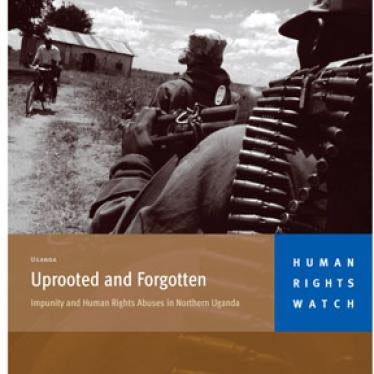(New York) - Genuine initiatives aimed at ending the devastating armed conflict in northern Uganda are welcome, but amnesties for war crimes and crimes against humanity must not be on offer, Human Rights Watch said today.
On July 14 peace talks began between the Ugandan government and the rebel Lord's Resistance Army (LRA) in Juba, the capital of the regional government of Southern Sudan. As part of a peace package, the Ugandan government delegation is offering amnesty to all LRA combatants, including five top LRA leaders for whom the International Criminal Court (ICC) has issued arrest warrants on charges of war crimes and crimes against humanity.
Human Rights Watch has documented human rights violations committed by the LRA over the years, including torture, sexual abuse, mutilations, recruitment of child soldiers, and forcing children to kill even members of their own families.
"The LRA Five are accused of widespread sexual slavery, murder, and brutalization of children over two decades," said Richard Dicker, director of Human Rights Watch's International Justice Program. "Amnesty or similar measures can not be on the table when it comes to these kinds of crimes."
International law rejects impunity for serious crimes, such as genocide, war crimes, crimes against humanity and torture. International treaties, including the U.N. Convention against Torture, the Geneva Conventions, and the Rome Statute of the International Criminal Court, require parties to ensure alleged perpetrators of serious crimes are prosecuted. Uganda has ratified each of these in addition to numerous other human rights treaties.
According to U.N. Secretary-General Kofi Annan, amnesties cannot be granted for serious crimes under international law, and peace agreements endorsed by the United Nations can never provide such amnesties.
The creation of the International Criminal Court and other international criminal tribunals to prosecute genocide, war crimes, crimes against humanity or other serious violations of humanitarian law illustrates the strong international commitment to justice for serious crimes.
"We have seen time and again that turning a blind eye to justice only undercuts durable peace," said Dicker. "How long can a peace based on this kind of deal last?"
The United Nations and key governments, particularly the United States and the United Kingdom, should continue to speak out strongly against amnesty for war crimes and crimes against humanity.
The devastating effect of amnesties for serious crimes can be seen in the example of Sierra Leone. In 1999 the Revolutionary United Front leader Foday Sankoh - allegedly responsible for brutal crimes including mutilations, murder and rape - received an amnesty and was rewarded with control of a government commission in exchange for signing the Lomé peace accord, which was supposed to end Sierra Leone's brutal war. Sankoh soon went on to attack both government forces and U.N. peacekeepers, taking hundreds of them hostage. The revived conflict was not declared over until more than two years later. Meanwhile, prosecution was pursued under the Special Court for Sierra Leone and has helped to marginalize the abusive leaders of the warring parties.
Notably, the peace agreement that settled the 21-year war in southern Sudan in January 2005 did not include an amnesty. The government of Southern Sudan (GoSS), composed of former southern Sudanese rebels, came to power through this agreement, which was approved by the Security Council. The GoSS is now sponsoring the peace talks between the LRA and the Ugandan government.
To supplement investigation and prosecutions by the International Criminal Court, Uganda also should conduct meaningful prosecutions in its own courts, Human Rights Watch said. In addition, the Ugandan government should establish a truth commission or another truth-telling process that would allow people in northern Uganda a forum to speak about the human rights abuses that occurred during the war. This process could work alongside traditional reconciliation measures in which those affected wish to participate.
Background on Northern Uganda and the ICC's Arrest Warrants for LRA Members
The conflict in northern Uganda to depose President Yoweri Museveni began immediately after he took power by force in 1986. The rebel Lord's Resistance Army, based in northern Uganda, struck fear in the civilian population by carrying out mutilations, killings and forced recruitment of child soldiers mostly from the Acholi people of northern Uganda, although LRA leader Joseph Kony is Acholi himself. Human Rights Watch has also documented abuses by Ugandan government forces, including rape.
In December 2003 Museveni invited the International Criminal Court to investigate the LRA. In July 2005 the court issued warrants for the arrest of the top five LRA leaders - Vincent Otti, Okot Odhiambo, Raska Lukwiya and Dominic Ongwen, as well as Joseph Kony - for crimes including widespread or systematic murder, sexual enslavement, rape, and war crimes such as intentionally attacking civilians and abducting and enlisting children under the age of 15.







